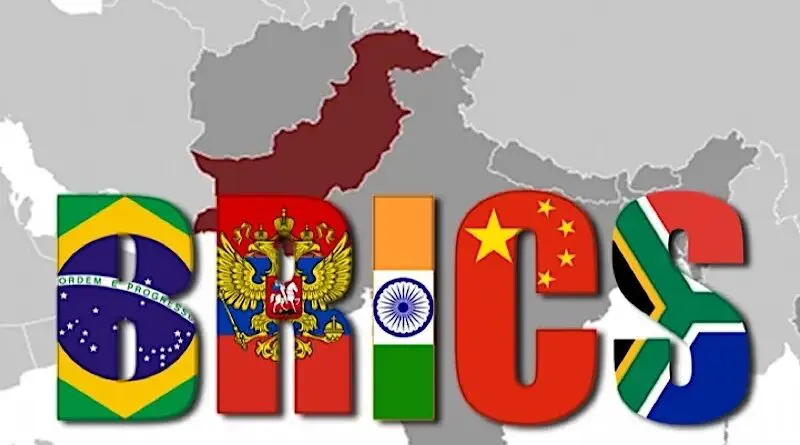The Expansion Of BRICS: Challenges And Opportunities For Pakistan – OpEd
By Sana Ullah
The 15th summit of the BRICS member states was held in Johannesburg, South Africa, on August 31, 2023. These groups of big emerging national economies have announced the addition of six new members in an attempt to restructure the global liberal economic order and provide a counterbalance to the US and its western allies.
As announced at the Johannesburg Summit, the six new members will be admitted at the beginning of this year. These states include Iran, Saudi Arabia, Egypt, Argentina, the UAE, and Ethiopia; they joined the existing members of BRICS. Last year, Pakistan also submitted the formal application for BRICS. The main purpose of submitting the application is to become part of this new global economic alliance in order to overcome its economic troubles. Since the expansion of BRICS, the geo-economic landscape of the globe has experienced significant change. Therefore, it is necessary to examine the changing dynamics of the world and Pakistan’s engagement with BRICS. Pakistan’s addition to this group of nations can also create many opportunities as well as challenges for Pakistan. Thus, it is important to examine both the opportunities and challenges for Pakistan in this group.
The word “BRICS” is an acronym representing a cluster of the five major emerging economies like Brazil, Russia, India, China, and South Africa. At first, it was known as “BRIC” before South Africa joined this association in 2010. The countries in this association of states represent 41% of the world population and currently hold more than 25% of the world’s GDP. Last year, the bloc decided to add six new members at the start of 2024. This development increased the economic might of the BRICS, as the coalition will now represent over $30 trillion in GDP, or around 29% of the global GDP. This group of states aims to promote economic cooperation and influence regional and global affairs around the world. Across multiple continents, these states share common goals of fostering development, addressing global challenges, and reforming the structure of international financial institutions to better reflect the diverse interests of emerging economies. The BRICS nations collectively represent a significant force in shaping the geo-economic landscape.
Though the economy of Pakistan is on the deathbed and bearing different economic shocks, that makes Pakistan dependent on the IMF and the World Bank for loans to overcome its own economic crisis. These traditional lending institutions, the IMF and the World Bank, provide condition-based loans to countries that affect their domestic policies. By joining BRICS, Pakistan can get loans from the New Development Bank on easy terms, as it will help to decrease its dependence on traditional institutions such as the IMF and the World Bank. Pakistan’s addition to these emerging economies can create many greater economic opportunities. For instance, Pakistan can get access to the markets of these countries, and the economic competence of these nations can provide Pakistan with foreign direct investment opportunities.
Pakistan can also benefit from the technological exchange and infrastructure initiatives of the BRICS. Some of the nations in the BRICS have a good track record in infrastructure development, particularly China, which has invested billions of dollars in infrastructure development in the last few decades. Engaging with BRICS can boost Pakistan’s infrastructure development, regional connectivity, and overall economic strength. Furthermore, in this new economic forum, Pakistan can strengthen its diplomatic ties and expand its web of allies and strategic partners, as it is necessary to strengthen Pakistan’s position in the global arena.
On the other hand, there are also many challenges for Pakistan in engaging with the BRICS nations. The first and foremost challenge is that India is reluctant to accept Pakistan’s membership in this group of emerging economies. At the Jonesburg Summit of the BRICS nations, Pakistan was not invited, and the Pakistani authorities claimed that India opposed Pakistan’s invitation to the summit. Despite it, as a part of BRICS, it would be a difficult diplomatic test for Pakistan to maintain its existing relations with the United States and its Western allies. Therefore, Pakistan needs to strike a balance in the complex structures of international relations in order to avoid isolation and keep functioning in the system.
Although there are many economic opportunities in this new bloc, it also poses a challenge for Pakistan because of its weak economic condition and weak industrial development sector. The industries in Pakistan may face competition from the highly technologically advanced and developed economies of the BRICS. This created a need for Pakistan to introduce demanding economic and strategic planning to advance the industries that would enhance Pakistan’s role in the international arena.
Moreover, in international relations, where relative gains in the form of interest signify the national interests of a state, different geopolitical stances of states on different regional and international security issues to preserve their interests may lead to a conflict within the BRICS. To sail across all these geopolitical priorities and differences while securing Pakistan’s own security interests is a difficult task, demanding a smart diplomatic approach from the decision-making authorities in Pakistan.
In a nutshell, Pakistan stands at a critical point in the changing world order, poised to outline its future course in a rapidly fluctuating international landscape. Thus, the expansion of BRICS and Pakistan’s engagement with these groups of emerging economies present both challenges and opportunities in the changing dynamics of the world. In order to avail perks from this forum, which offers economic opportunities while presenting the challenges of increased economic competition among the nations of the BRICS, Pakistan’s policymakers need to act smartly in order to minimize the cost and maximize the benefit of engaging with this alliance of growing economies.

